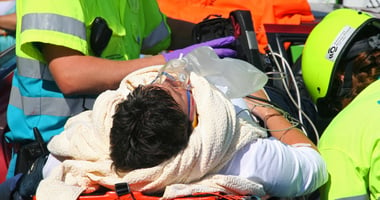Adolescents who have suffered a previous concussion have a three-fold greater risk of having a...
Adult Anxiety and Poorer Function Linked to Childhood Depression But Can Be Prevented
 |
However, children who receive specialty mental health services have a significantly reduced risk of adult psychiatric diagnoses, particularly anxiety, wrote William E. Copeland, Ph.D., a professor of psychiatry at the University of Vermont, and colleagues.
“In our study, children/adolescents who had met criteria for depression and had also received specialty mental health services were almost half as likely to receive an anxiety diagnosis as adults compared to their depressed peers who did not receive specialty mental health services,” they wrote.
A total of 1,420 participants in the Great Smoky Mountains Study were interviewed up to eight times between the ages 9 and 16 to assess for depressive disorders, associated psychiatric comorbidities, and childhood adversities (including low socioeconomic status, family dysfunction, abuse and neglect, and peer victimization) using the structured Child and Adolescent Psychiatric Assessment. They were interviewed again at ages 19, 21, 25, and 30 using the structured Young Adult Psychiatric Assessment Interview for psychiatric outcomes and functional outcomes.
A total of 7.7% of participants met criteria for a depressive disorder in childhood/adolescence. “Childhood/adolescent depression status was strongly associated with all types of other childhood psychiatric disorders and with most types of childhood adversities,” Copeland and colleagues wrote.
They found that childhood/adolescent depression was associated with higher rates of adult anxiety and depression and substance use disorders later in life. It was also associated with worse adult functional outcomes including poorer physical health, risky and/or criminal behavior, poorer financial status and/or educational performance, and poorer social function.
However, Copeland and colleagues also found that specialty mental health services for children could have long-term effects: Just 31.8% of children who had received mental health services had anxiety as adults, compared with 57.5 % of those who did not. (The effects of mental health services did not extend to other functional outcomes.)
“[E]fforts to reduce the public health burden of depression should focus on reducing children’s cumulative exposure to depression and depressive symptoms,” they wrote. “The optimal strategy will likely involve public policies that target psychosocial risk factors associated with depression symptoms (for example, caregiver instability, maltreatment).”
(Image: iStock/KatarzynaBialasiewicz)
APA Survey on Racism Closes Tomorrow (August 6)
The APA Presidential Task Force to Address Structural Racism Throughout Psychiatry invites you to complete the second in a series of surveys on how racism impacts the field of psychiatry. Your answers will be anonymous. They will be used to inform the Task Force’s work and may be anonymously cited in future work. The survey closes tomorrow, Thursday, August 6.





